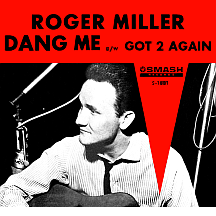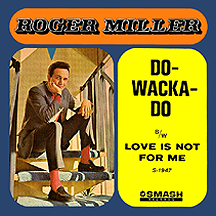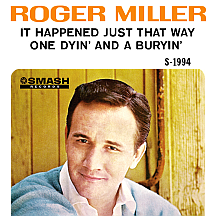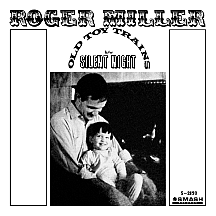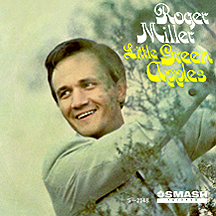ROGER MILLER
Well, "Do-Wacka-Do" to you! Roger Miller established his public image with nonsense sayings just like this (though he said it more insultingly, and humorously, than I just did). But his songs, be they silly or serious, had a deeper point to make about life in America and/or human strengths and weaknesses. As a child, making up songs provided escape from a number of difficulties he faced. His father passed away during his infancy and his mother became seriously ill, resulting in Roger and his two older brothers being sent away from their home town of Fort Worth, Texas to live with relatives...three different sets of them. He was raised by an uncle and aunt who had a farm near the small town of Erick, Oklahoma (the birthplace of another oneday country star, Sheb Wooley). By the time he was in elementary school he was creating catchy tunes and rhymes to go with them; he left home during his teens and wandered around parts of Oklahoma and Texas, taking odd jobs and seeing country acts perform whenever possible while trying to figure out a way to break into the business.
He served in the Army during the Korean War, finishing his service at Fort McPherson near Atlanta, Georgia, where he played fiddle for The Circle A Wranglers, a band led by Faron Young, who in 1953 was just beginning a long run of top sellers for Capitol Records. After his discharge Roger headed to Nashville, Tennessee and, in an effort to hobnob with singers and songwriters in the city's music district, he took a job as a bellhop at the Andrew Jackson Hotel on Sixth Avenue, right in the heart of downtown. Soon he was working part time as a fiddle player with comedian-singer Minnie Pearl's band. George Jones took a liking to Miller, who was 21 in 1957, and got him in the door at Mercury-Starday Records, run by Don Pierce, one of Starday's founders. Roger's first release was a really down-home hillbilly song, "My Pillow." Though quite some time passed before "The Singing Bellhop" had a hit record, he was well on his way to establishing himself as a hot Music City songwriter.
A big break came in '57 when Ray Price, who'd been one of C&W's hottest acts for four years, hired him for his band The Cherokee Cowboys. Roger offered some of his songs to Price, who liked "Invitation to the Blues" and had a huge hit with it in the latter half of 1958. Almost immediately, other artists along music row became interested in the young composer's work; Ernest Tubb recorded "Half a Mind" and Roger's pal Faron Young did "That's the Way I Feel," both top ten country hits late in the year. Miller had signed with Tree Publishing and Buddy Killen proved to be a great help in getting the word out. Decca handed him a couple of assignments backing established artists; he recorded "On This Mountain Top" with Donny Young (who became a star after changing his name to Johnny Paycheck) and "Mine is a Lonely Life" with Ernest's son Justin Tubb, receiving label credit on both singles.
Faron found himself in need of a drummer, and though Roger didn't play, he was a quick learner and rejoined the band, pounding skins for Young for the next year. His compositions continued to connect at a steady clip: Jim Reeves scored in '59 with "Billy Bayou" (a number one country hit) and "Home." A year later, Ray Sanders broke through with Roger's "A World So Full of Love." He got on Chet Atkins' good side and joined RCA Victor, where the so-called "Nashville Sound" (strings and such!) was in the process of transforming country music. Roger's bouncy "You Don't Want My Love" ('...in the summertime, when all the trees and leaves are green...and the redbird sings...'), with his 'shoo-be-doo-be-do's and falsetto parts, became his first hit as a singer near the end of 1960; Andy Williams covered the song for the pop market.
Bill Anderson, whose career was on the rise at this time, had known Roger since his Army days. Together they wrote "When Two Worlds Collide" and Roger's recording of the soft ballad became his first top ten country hit in July '61. Claude Gray benefited from his songwriting expertise that summer with "My Ears Should Burn (When Fools Are Talked About)" and Del Shannon's version of his poignant "The Swiss Maid" made a showing on the pop chart in '62. Miller's popularity suddenly exploded that year due to two fateful appearances on NBC's Tonight Show during the time between Jack Paar's reign as host and Johnny Carson's debut. Jimmy Dean was one of many fill-in hosts; he invited Roger to appear one night in July and the singer's naturally zany personality left viewers craving more. Another Tonight appearance the following month when Merv Griffin was hosting went so well that Roger considered chucking his music career for one in television.
Another ballad, "Lock, Stock and Teardrops," was his final RCA single. Mercury subsidiary Smash Records had been running hot since its 1961 inception with chart-topping pop hits by Joe Dowell, Bruce Channel and The Angels, though the label's limited number of country efforts had failed to catch on. Session guitarist Jerry Kennedy, who'd played on one or two of Miller's RCA recordings, was working in A&R for Mercury and pitched the singer to Smash prez Charlie Fach; Roger was signed to the label based on his Tonight Show appearances. His first recordings were made at Owen Bradley's infamous Quonset hut studio in Nashville in January 1964. Kennedy insisted on keeping a loose atmosphere, allowing Roger to...be Roger, the same guy people had seen cutting up on late night TV.
"Dang Me," a simple but boldly humorous song ('...they oughta take a rope and hang me!'), broke simultaneously at top 40 and country radio in the summer of '64, reaching the top ten and number one positions, respectively, on those charts (the song was so big it inspired an answer, "Dern Ya," a top 20 country hit by Nashville native Ruby Wright). A sudden sensation, Roger spent the rest of the year darting from one venue to another, performing his casually wacky brand of music while squeezing in recording dates. "Chug-A-Lug" made no bones about booze ('...make you wanna holler hi-de-ho...burns your tummy, don'tcha know!') with tall tales about drinking '...grape wine in a mason jar' and uncovering '...a covered-up moonshine still!' It shot to the top ten in October. Then envy reared its comical head with "Do-Wacka-Do": 'I hear tell you're doin' well...good things have come to you...I wish I had your good luck charm...and you had a dowackadowackadowackadowackado!!!' Fans were anxious to see what their new favorite singer would come up with next!
These initial recordings had been so spectacularly successful that Roger continued to work with the same musicians (guitarists Harold Bradley and Ray Edenton, bassist Bob Moore, drummer Buddy Harman and pianist Hargus "Pig" Robbins, who'd made records as Mel Robbins) on nearly everything he did for Smash. In November he recorded the biggest hit of his career, his "hobo song" as Charlie Fach called it, "King of the Road," inspired by a sign he'd spotted somewhere during his '64 touring crunch: "Trailers for sale or rent." He spent most of the summer expanding on the idea ('Third boxcar, midnight train...destination Bangor, Maine...') and the easygoing result, a shift in tone from the earlier songs, put him back at the top of the country charts and into the pop top ten in the spring of '65. This, too, spawned an answer song, "Queen of the House," a breakthrough hit for Jody Miller, same last name, no relation...except in a kindred music-biz kind of way.
The Grammy Awards for 1964 were handed out the following April and Roger came up a big winner with five awards for "Dang Me," sweeping the country categories (Best Female Vocalist, of course, being the only one he wasn't eligible for). And the hits kept coming: cool little train/sad love song "Engine Engine #9" reached the high-chart vicinity of the previous singles. In an effort to avoid being branded as a backwoods-type novelty artist, he offered up some of the more serious songs he'd written. It must have been a dark day when he came up with "One Dyin' and a Buryin'" (spoken: 'The love that once was warm and then just somehow turned to hate...made my life a prison from which there's only one escape'), referred to by Mercury staffers as a "suicide song." "Kansas City Star" pointed out the good and bad sides of being a local kiddie-show TV personality and "England Swings," his fifth top ten pop hit, came off as a whimsical love letter to the land of 'Westminster Abbey' and 'the tower of Big Ben,' also known as home to all the British Invasion music acts whose competition he'd faced head-on for well over a year.
The simple, spare lyrics of his early 1966 hit "Husbands and Wives" seem to reflect his own failed first marriage, while other singles that year ("You Can't Roller Skate in a Buffalo Herd," "My Uncle Used to Love Me But She Died") were more slapstick than previous efforts. Then came additional Grammys for Miller's mantle...six for 'King of the Road," including two in Rock and Roll categories, bringing his total to eleven! Jody Miller even won the Female Vocalist award for her "Queen"-ly housewife's lament. With television variety shows becoming more common, NBC offered Roger his own hourlong series; The Roger Miller Show premiered in September, but producers didn't allow its star enough opportunity to exhibit his own unique style, instead relying heavily on scripted gags. The show was canceled in December after just 16 episodes.
"Walkin' in the Sunshine" was his biggest hit of '67, after which he began to rely more on other writers' works. Bobby Russell's "Little Green Apples" was a solid seller for Miller in spring '68, but was overshadowed several months later by a million-selling cover by former Count Basie vocalist O.C. Smith. He was the first to record Kris Kristofferson's "Me and Bobby McGee" in 1969 (Kris was in the studio at the time), but it too was eclipsed by Janis Joplin's version, a number one hit in '71.
He gave acting a try with a credible performance as "Johnny Appleseed" in a September 1969 episode of Fess Parker's NBC western series Daniel Boone. Smash Records ceased operations in 1970 and Roger was switched to Mercury until '73, after which he recorded for Columbia for a couple of years. Other acting roles included a 1970 episode of Love American Style and, much later, guest spots on '80s series Quincy M.E. and Murder, She Wrote. His most notable role, perhaps, came in 1973 with the animated Disney movie Robin Hood; he supplied the voice of Alan-a-Dale the Rooster and wrote and sang "Whistle Stop," "Oo-De-Lally" and "Not in Nottingham." In 1978 he married former Kenny Rogers and the First Edition singer Mary Arnold (his third wife) and they often performed together.
At a point where Roger's career had stalled, theater producer Rocco Landesman offered him a chance to compose the score for a Broadway musical. Big River (based on Mark Twain's The Adventures of Huckleberry Finn) turned out to be extremely popular, playing more than one thousand performances on Broadway from April 1985 to September 1987. The award for Best Original Score came his way when the Tony Awards were handed out in June '85. It was a great late-career achievement for the multi-talented singer-songwriter. "Late-career" may seem like an odd designation for a 49-year-old, but things unfortunately went downhill from there. He was diagnosed with throat cancer in 1991 and died in October of the following year at age 56. Hyperactive, naturally energetic, never one to sleep much, he didn't bother to deprive himself of the pleasures of smoking, drinking, or popping pills to aid in his overactive pursuit of success. Roger Miller once said, "If I had my life to live over, I wouldn't have time." I'd say he crammed something like 76 years of living into his 56 while amassing a fabulous, humorous, seriously entertaining body of work for all of us to enjoy.
NOTABLE SINGLES:
- Can't Stop Lovin' You - 1958
- On This Mountain Top - 1958
by Donny Young with Roger Miller - Mine is a Lonely Life - 1958
by Justin Tubb with Roger Miller - The Wrong Kind of Girl - 1959
- Sweet Ramona - 1959
- You Don't Want My Love - 1960
- When Two Worlds Collide - 1961
- Lock, Stock and Teardrops - 1963
- Dang Me - 1964
- Chug-A-Lug - 1964
- Do-Wacka-Do - 1964
- King of the Road - 1965
- Engine Engine #9 - 1965
- One Dyin' and a Buryin' /
It Happened Just That Way - 1965 - Kansas City Star - 1965
- England Swings - 1965
- Husbands and Wives /
I've Been a Long Time Leavin' - 1966 - You Can't Roller Skate in a Buffalo Herd - 1966
- My Uncle Used to Love Me But She Died - 1966
- Heartbreak Hotel - 1966
- Walkin' in the Sunshine - 1967
- The Ballad of Waterhole #3 (Code of the West) - 1967
- Old Toy Trains - 1967
- Little Green Apples - 1968
- Vance - 1968
- Me and Bobby McGee - 1969
- Where Have All the Average People Gone - 1969
- South - 1970
- Tomorrow Night in Baltimore - 1971
- Open Up Your Heart - 1973


